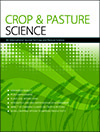Potassium deficiency is increasingly common throughout the agricultural zones of Western Australia, due to continuous removal of potassium in grain and hay, with little fertiliser input. It has become a limiting factor for crop yields. We review the long-term rundown of plant-available potassium across the region, and address soil and crop factors and farming practices that may affect soil availability and potassium use efficiency in dryland agriculture. Future research is also discussed.
CP21612 Abstract | CP21612 Full Text | CP21612PDF (3.9 MB) Open Access Article





